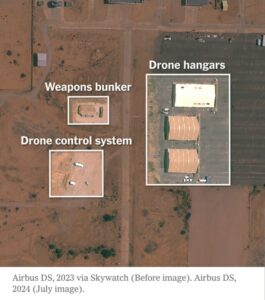How a U.S. Ally Uses Aid as a Cover in War

By The New York Times By Declan Walsh and Christoph Koettl
The drones soar over the vast deserts along the Sudanese border, guiding weapons convoys that smuggle illicit arms to fighters accused of widespread atrocities and ethnic cleansing.
They hover over a besieged city at the center of Sudan’s terrible famine, supporting a ruthless paramilitary force that has bombed hospitals,looted food shipments and torched thousands of homes, aid groups say.
Yet the drones are flying out of a base where the United Arab Emirates says it is running a humanitarian effort for the Sudanese people —part of what it calls its “urgent priority” to save innocent lives and stave off starvation in Africa’s largest war.
The Emirates is playing a deadly double game in Sudan, a country shredded by one of the world’s most catastrophic civil wars.
Eager to cement its role as a regional kingmaker, the wealthy Gulf petrostate is expanding its covert campaign to back a winner in Sudan, funneling money, weapons and, now,powerful drones to fighters rampaging across the country, according to officials, internal diplomatic memos and satellite images analyzed by The New York Times.
All the while, the Emirates is presenting itself as a champion of peace, diplomacy and international aid. It is even using one of the world’s most famous relief symbols — the Red Crescent, the counterpart of the Red Cross — as a cover for its secret operation to fly drones into Sudan and smuggle weapons to fighters, satellite images show and American officials say.
The war in Sudan, a sprawling gold-rich nation with nearly 500 miles of Red Sea coastline, has been fueled by a plethora of foreign nations, like Iran and Russia. They are supplying arms to the warring sides, hoping to tilt the scales for profit or their own strategic gain — while the people of Sudan are caught in the crossfire.
But the Emirates is playing the largest and most consequential role of all, officials say, publicly pledging to ease Sudan’s suffering even as it secretly inflames it.

Starvation haunts Sudan Famine was officially declared last month after nearly 18 months of fighting, which has killed tens of thousands and scattered at least 10 million people in the world’s worst displacement crisis, the United Nations says. Aid groups call it a calamity of “historic proportions.”
The Emirates says it has made “absolutelyclear” that it is not arming or supporting “any of the warring parties” in Sudan. To the contrary, it says, it is “alarmed by the rapidly accelerating humanitarian catastrophe” and pushing for an “immediate cease-fire.
”
But for more than a year, the Emirates has been secretly bolstering the Rapid Support Forces, or R.S.F., the paramilitary group fighting Sudan’s military for control of Africa’s third-largest country.

A Times investigation last year detailing the Emirati weapons smuggling operation was confirmed by U.N. investigators in January,when they cited “credible” evidence that the Emirates was breaking a two-decade U.N. arms
embargo in Sudan.
Now, the Emiratis are amplifying their covert campaign. Powerful Chinese-made drones, by far the largest deployed in Sudan’s war, are being flown from an airport across the border in Chad that the Emirates has expanded into a
well-equipped, military-style airfield.
Hangars have been built and a drone control station installed, satellite images show. Many of the cargo planes that have landed at the airport during the war previously transported weapons for the Emirates to other conflict zones, like Libya, where the Emiratis have also been accused of breaching an arms embargo, a Times analysis of flight tracking data found.
American officials say the Emiratis are nowusing the airport to fly advanced military drones to provide the R.S.F. with battlefield intelligence,and to escort weapons shipments to fighters in Sudan — to keep an eye out for ambushes.
Through an analysis of satellite images, The Times identified the type of drone being used:the Wing Loong 2, a Chinese model oftencompared to the MQ-9 Reaper of the U.S. Air Force.
The images show an apparent munitions bunker at the airport and a Wing Loong ground controlstation beside the runway — only about 750 yards from an Emirati-run hospital that has treated wounded R.S.F. fighters.

The Wing Loong can fly for 32 hours, has a range of 1,000 miles and can carry up to a dozen missiles or bombs. So far, the drones do not seem to be conducting airstrikes of their own in Sudan, officials say, but are providing surveillance and identifying targets on chaotic battlefields.
That makes them “a significant force multiplier,” said J. Michael Dahm, a senior fellow at the Virginia-based Mitchell Institute for Aerospace Studies.
After taking off from the base, the drones may in fact be piloted remotely from Emirati soil, experts and officials say. Recently, they have been detected patrolling the skies above the embattled Sudanese city of El Fasher, where people are starving and surrounded by the R.S.F. The city is home to nearly two million people, and fears are rising that the war is on the precipice of even more atrocities.
Vice President Kamala Harris confronted the leader of the Emirates, Sheikh Mohammed bin Zayed, over his country’s support of the R.S.F.when the two met in December, according to officials briefed on the exchange. President Biden called this week for an end to the “senseless war,” warning that the R.S.F.’s brutal, monthslong siege on El Fasher “has become a full-on assault.”
The crisis is expected to come up again when he and Ms. Harris host the Emirati leader at the White House for the first time on Monday.“It’s got to stop,” John F. Kirby, a White House spokesman, said of the siege.
‘They Can’t Lie to Us Anymore”
Both sides in Sudan’s civil war have been accused of war crimes, including brutal assaults filmed by the fighters themselves.The war erupted in 2023, when a power struggle between Sudan’s military and the R.S.F. — a fighting force it helped create — erupted into gunfire on the streets of the capital and quickly enveloped the nation.
Sudanese military planes have bombed civilians, while rights groups accuse the R.S.F. of ethnic cleansing and indiscriminate shelling that has destroyed hospitals, homes and aid warehouses.
In El Fasher, Doctors Without Borders has accused the military of bombing a children’s hospital, and R.S.F. troops of plundering food intended for a camp of 400,000 starving people.
The Emirates insists it is simply trying halt the war and help its victims. It has provided $230 million in aid and delivered 10,000 tons of relief supplies, and it played a prominent role in recent American-led peace talks in Switzerland.
“The U.A.E. remains committed to supporting the people of Sudan in restoring peace,” Lana Nusseibeh, an Emirati minister for foreign affairs, said afterward.
Senior American officials have privately tried to coax the Emirates to drop its covert operations,bluntly confronting it with American intelligence on what the Gulf state is doing inside Sudan, said five American officials with knowledge of the conversations.
After Vice President Harris raised American objections to the arms smuggling with Sheikh Mohammed in December, the Emirati leader offered what some officials considered a tacit acknowledgment.
While not admitting direct support to the R.S.F., Sheikh Mohammed said he owed the
paramilitary group’s leader, Lt. Gen. Mohamed Hamdan, for sending troops to fight alongside the Emirates in the war in Yemen, according to two American officials briefed on the exchange.
Sheikh Mohammed also said he viewed the R.S.F. as a bulwark against Islamist political movements in the region, which the Emirati royal family has long considered a threat to its authority, the officials said. (The Emirati
government did not respond to questions about the conversation.)
“They can’t lie to us anymore, because they know that we know,” said one American official who, like others, was not authorized to speak publicly about the intelligence.
Relief organizations are particularly incensed with the Emirates, accusing it of running “a Potemkin aid operation” to disguise its support to the R.S.F., according to Jeremy Konyndyk,president of Refugees International and a former Obama and Biden administration official.
“They want it both ways,” he said of the Emiratis. “They want to act like a rogue, supporting their militia client and turning a blind eye to whatever they do with their weapons. And they want to appear like a constructive, rules-abiding member of the international system.”
Sudan’s civil war has turned the country,perched strategically on the Red Sea, into a global free-for-all. Iran has supplied armed drones to the Sudanese military, which has fought alongside Ukrainian special forces in the capital, Khartoum. Egypt has also sided with the military.
“The delivery of drones, howitzers, multiple rocket launchers and MANPADS to the R.S.F. by the U.A.E. has helped it neutralize the air superiority” of Sudan’s military, the European Union ambassador to Sudan, Aidan O’Hara wrote in February in a confidential memo obtained by The Times.
The memo contained other startling assertions:that Saudi Arabia has given money to Sudan’s military, which used it to buy Iranian drones; that as many as 200,000 foreign mercenaries were fighting alongside the R.S.F.; and that Wagner mercenaries had trained the R.S.F. to use the antiaircraft missiles supplied by the Emirates.
The Emirati role appears to be part of a broader push into Africa. Last year, it announced $45 billion in investments across the continent,analysts say, nearly twice as much as China. Recently, it has expanded into a new business: war.
It turned the tide of Ethiopia’s civil war in 2021 by supplying armed drones to the prime minister at a crucial point in the fight, ultimately helping him emerge victorious. Now it appears to be trying to repeat the same feat in Sudan with the R.S.F.The Arms Pipeline Last year, when cargo planes began to land at the airport in Amdjarass, 600 miles east of the Chadian capital, Ndjamena, the Emirates said it had come to establish a field hospital for Sudanese refugees.
But within months, American officials discovered that the $20 million hospital quietly treated R.S.F. fighters, and that the cargo planes also carried weapons that were later smuggled to fighters inside Sudan.
The Times analysis of satellite images and flight records showed that the Emiratis set up the drone system at the same time they were promoting their humanitarian operation.
During a lengthy phone call in early May with his Emirati counterpart, President Biden’s national security adviser, Jake Sullivan, cited American intelligence that had been declassified so that it could be shared with a foreign official.
The evidence documented Emirati military support to the R.S.F., two American officials briefed on the exchange said. But the American candor appears to have had little impact. The Emirates has only doubled down on its support to the R.S.F. in recent months, American officials and witnesses in Chad say.
Fewer cargo flights now land at Amdjarass airport, where they can be easily detected, but a greater proportion of supplies arrives by truck,often along routes that bypass major cities and towns, officials say.
Traces of Emirati-supplied weapons are also being found on the battlefield. Human Rights Watch recently identified Serbian-made
missiles, fired from an unidentified drone, that it said were originally sold to the Emirates.
“It’s very clear — the U.A.E. is sending money,the U.A.E. is sending weapons” said Succès Masra, a former prime minister of Chad.
After complaints from Western officials, he said,he told his nation’s president, Mahamat Idriss Déby, that allowing the Emirates to funnel weapons through Chad was a “huge mistake.” Nothing changed. The Emirates promised Mr.Déby a $1.5 billion loan, nearly as big as Chad’s $1.8 billion national budget a year earlier.
The Emirates supports the R.S.F. in other ways,
